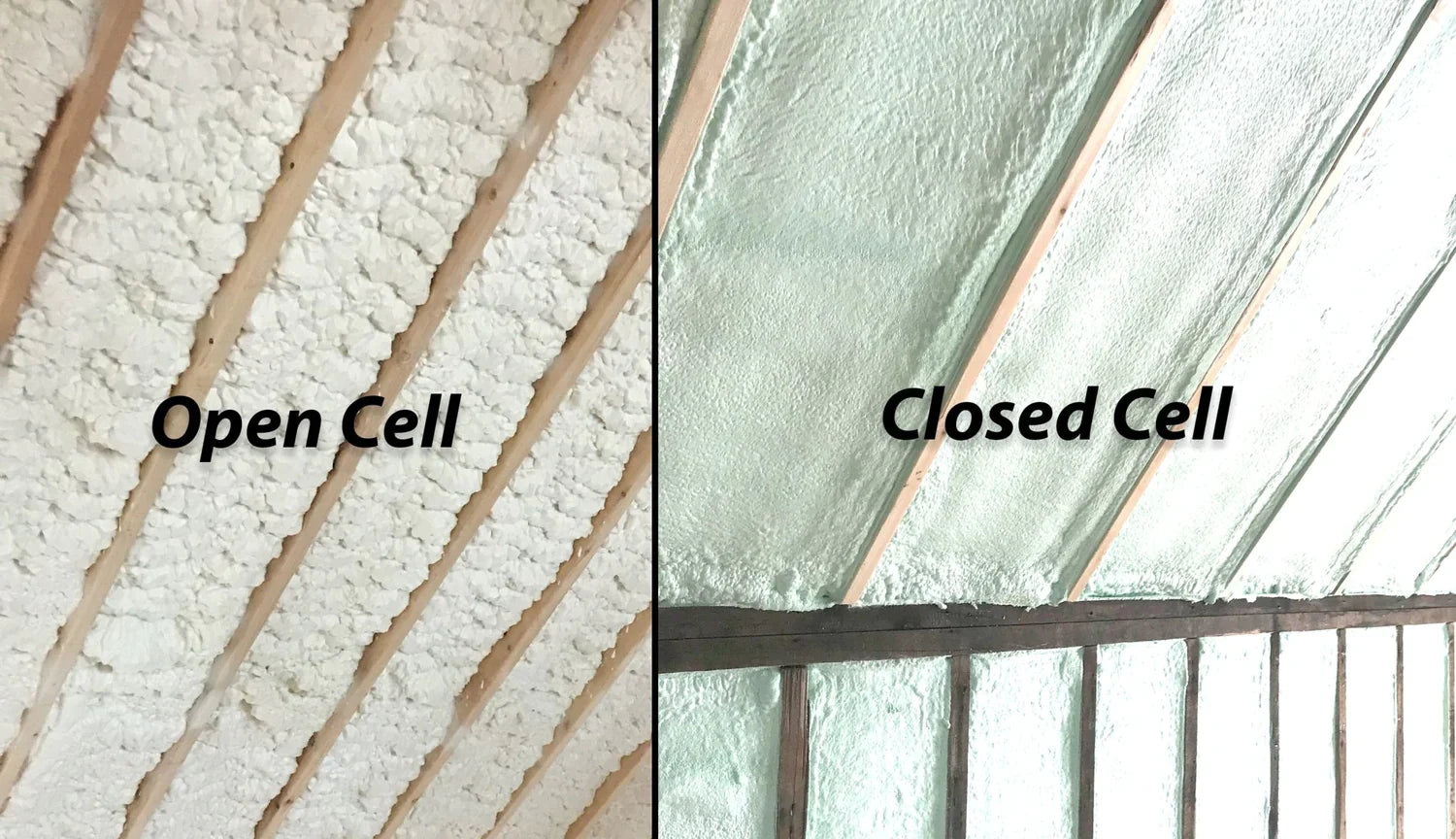Home attic insulation is the key to long-term energy and money savings. However, choosing the appropriate foam is important for thermal comfort and moisture control. So, should you choose open-cell or closed-cell spray foam for your attic insulation?
Generally, closed-cell spray foam is more suitable for colder climates because of its higher R-value and better moisture control. This spray foam helps prevent condensation and moisture damage in the attic, which is perfect for places with high humidity. Also, closed-cell spray foam offers better insulation and energy efficiency than open-cell foam.
Throughout this article, we will explore the benefits of closed-cell spray foam for attic insulation instead of open-cell foam. If you understand these factors, you can make an informed attic insulation decision.
Why is Closed-Cell Spray Foam Better Than Open Cell Foam for Attic Insulation?
When deciding between open and closed cell foam for attic insulation, there are several points to consider.
Climate Consideration
To optimize attic insulation, consider closed-cell foam's superior thermal barrier and moisture resistance. This foam insulation has a greater R-value per inch than open-cell foam, offering better insulation against heat transfer.
Closed-cell spray foam has an R-value of around 6 to 7 per inch, while open-cell foam typically has an R-value of about 3.5 to 4 per inch. This means that closed-cell foam provides almost double the insulation value of open-cell foam.
Moisture Concerns
Closed-cell spray foam has increased density and a more compact structure than open-cell foam. This density allows closed-cell spray foam to act as a moisture barrier, preventing water vapor from penetrating and accumulating in the attic.
In areas where moisture is a significant concern, such as humid climates or areas prone to flooding, closed-cell spray foam is the better choice. Its closed-cell structure prevents water from being absorbed and trapped, reducing the risk of mold and bacterial growth.
Structural Requirements
If you're looking for attic insulation that provides structural integrity, closed-cell spray foam is the ideal choice. Closed-cell foam is known for its rigidity and strength, making it perfect for supporting the structural integrity of your building.
Unlike open-cell foam, which is softer and more flexible, closed-cell spray foam creates a solid barrier that can help reinforce your attic's structure. It acts as a strong adhesive, bonding to surfaces and providing increased stability.
This is especially important in areas with high winds or earthquakes, where additional structural support is necessary. The closed-cell foam also has a higher compressive strength, making it more resistant to foot traffic or heavy load damage.
Cost Consideration
Opt for closed-cell spray foam instead of open-cell foam in your attic to save on costs and ensure long-term insulation effectiveness. While open-cell foam may be more cost-effective initially, consider the long-term benefits and potential drawbacks.
Closed-cell foam has a higher R-value, providing better insulation and energy efficiency. It can lead to significant savings on heating and cooling costs over time. This foam insulation has a denser structure, supporting your attic.
While closed-cell spray foam may have a higher upfront cost, the long-term benefits make it a worthwhile investment for your attic insulation needs.

Closed-C![]() ell vs Open-Cell Spray Foam for Attic Insulation
ell vs Open-Cell Spray Foam for Attic Insulation
|
Feature |
Closed-Cell Spray Foam |
Open-Cell Spray Foam |
|
R-Value per Inch |
High (R-6 to R-7) |
Moderate (R-3.5 to R-4) |
|
Moisture Resistance |
Acts as a vapor and moisture barrier |
Vapor permeable |
|
Condensation Control |
Excellent |
Limited |
|
Air Sealing |
Fully airtight |
Air-sealing but not a vapor barrier |
|
Structural Strength |
Adds rigidity to roof deck |
No structural support |
|
Thickness Needed |
Thinner application |
Thicker application |
|
Best Climate |
Cold, humid, extreme climates |
Warm, dry climates |
|
Attic Suitability |
Best overall choice |
Limited use cases |
Why Do We Suggest Our Vega Foam Closed Cell Foam for Attic?
When selecting insulation for your attic, choosing a product that offers optimal performance is important. Our Vega Foam Closed Cell Foam is an excellent choice for attic insulation due to its superior R-value and other benefits:
Greater R-Value
Select our Vega Foam closed-cell spray foam for optimal attic insulation because it provides a greater R-value than other open or closed-cell foam options. With a typical R-value of R-7 per inch, this closed-cell spray foam offers superior insulation performance.
This higher R-value means our foam can better resist heat flow, regulating your attic temperature and reducing energy consumption. By selecting Vega Foam Closed Cell Foam, you can achieve better insulation results and improve your home's overall energy efficiency.
Wetness Resistance
For optimal attic insulation, consider applying Vega Foam closed-cell spray foam. This foam provides excellent wetness or moisture resistance, preventing mold and bacterial growth.
Our spray foam comprises tightly packed cells filled with gas, creating a barrier against moisture infiltration. Unlike open-cell foam, our Vega Foam closed-cell spray foam has a greater density and a closed structure, which makes it impermeable to water vapor.
Installation Process
Consider the ease of installation when insulating your attic space. Our closed-cell spray foam products are DIY-friendly and can be applied to ceilings, roofs, basements, and foundations.
Durability
Our Vega Foam closed-cell foam offers superior strength and resilience compared to open-cell foam. In contrast to typical open-cell foam, which has a softer and more flexible structure, our closed-cell spray foam is thicker and has a higher compressive strength.
For readers evaluating insulation options for an attic project, Vega Foam Closed Cell Spray Foam offers a practical balance of performance, durability, and efficiency. Exploring product specifications or seeking expert input can help determine whether this solution aligns with specific insulation goals.
Upgrade Your Attic with the Best Foam Insulation for Optimal Comfort
The type of foam insulation you choose for your attic can impact your home's overall thermal comfort and energy efficiency.
While both foams have pros and cons, closed-cell spray foam is a better choice for attics due to its excellent moisture resistance. Its dense structure provides better insulation, a higher R-value, and superior waterproofing.
To achieve optimal attic insulation, select Vega Foam Closed Cell Spray Foam. Its advanced technology ensures maximum energy efficiency, keeping your home comfortable and reducing energy costs.

Frequently Asked Questions About Attic Spray Foam Insulation
Is closed-cell spray foam safe for attic insulation?
Yes. Once cured, closed-cell spray foam is inert and safe for attic use. Proper ventilation during installation and following manufacturer guidelines ensure safe application.
Does closed-cell spray foam require attic ventilation?
Often, no. Closed-cell spray foam can create a conditioned (unvented) attic, improving energy efficiency. Local building codes and climate conditions should always be followed.
How thick should closed-cell spray foam be in an attic?
-
Typically applied at 2–4 inches, depending on energy code requirements
-
Provides high insulation value due to a high R-value per inch
-
Requires less thickness compared to other insulation types
-
Suitable for achieving strong thermal performance in limited space
Does closed-cell spray foam help prevent mold in attics?
-
Limits moisture intrusion and condensation
-
Acts as a vapor and air barrier
-
Reduces conditions that support mold and mildew growth
-
Helps keep attic spaces dry and protected over time
Is closed-cell spray foam worth the higher upfront cost?
In many cases, yes. While the initial cost is higher, closed-cell spray foam often delivers long-term savings through improved energy efficiency, durability, and moisture protection.
Will closed-cell spray foam reduce energy bills?
Yes. By sealing air leaks and providing superior thermal resistance, closed-cell spray foam helps maintain consistent indoor temperatures and lower heating and cooling costs.



